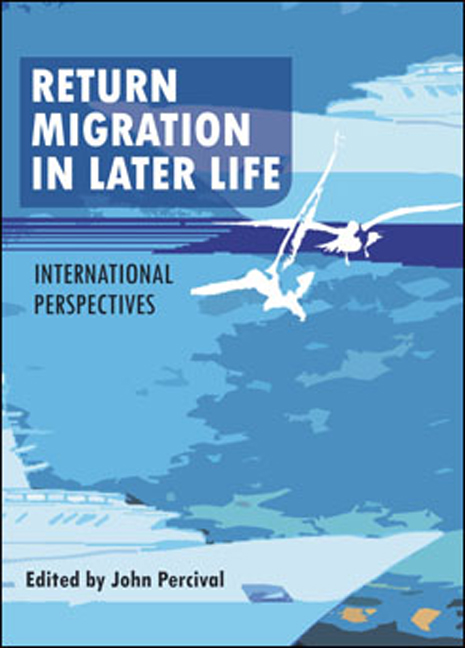Book contents
- Frontmatter
- Contents
- List of tables and figures
- Notes on contributors
- Acknowledgements
- one Charting the waters: return migration in later life
- two Older immigrants leaving Sweden
- three Place and residence attachments in Canada’s older population
- four Ageing immigrants and the question of return: new answers to an old dilemma?
- five Caribbean return migration in later life: family issues and transnational experiences as influential pre-retirement factors
- six ‘We belong to the land’: British immigrants in Australia contemplating or realising their return ‘home’ in later life
- seven Diasporic returns to the city: Anglo-Indian and Jewish visits to Calcutta in later life
- eight Returning to ‘roots’: Estonian-Australian child migrants visiting the homeland
- nine Ageing in the ancestral homeland: ethno-biographical reflections on return migration in later life
- ten ‘The past is a foreign country’: vulnerability to mental illness among return migrants
- eleven The blues of the ageing retornados: narratives on the return to Chile
- twelve Concluding reflections
- Endnotes
- Index
eleven - The blues of the ageing retornados: narratives on the return to Chile
Published online by Cambridge University Press: 01 February 2022
- Frontmatter
- Contents
- List of tables and figures
- Notes on contributors
- Acknowledgements
- one Charting the waters: return migration in later life
- two Older immigrants leaving Sweden
- three Place and residence attachments in Canada’s older population
- four Ageing immigrants and the question of return: new answers to an old dilemma?
- five Caribbean return migration in later life: family issues and transnational experiences as influential pre-retirement factors
- six ‘We belong to the land’: British immigrants in Australia contemplating or realising their return ‘home’ in later life
- seven Diasporic returns to the city: Anglo-Indian and Jewish visits to Calcutta in later life
- eight Returning to ‘roots’: Estonian-Australian child migrants visiting the homeland
- nine Ageing in the ancestral homeland: ethno-biographical reflections on return migration in later life
- ten ‘The past is a foreign country’: vulnerability to mental illness among return migrants
- eleven The blues of the ageing retornados: narratives on the return to Chile
- twelve Concluding reflections
- Endnotes
- Index
Summary
Introduction
The exiled migrant, who after many years is able to return to his or her former homeland, may have ambiguous feelings, related, for instance, to the drama of being forced to leave the homeland and to the dreams and longings accumulated in exile. This may also carry with it a dilemma, given development of social bonds in the host country during their time in exile. This creates a dynamic situation, one that the key-persons in this study, diasporic Chileans in Sweden, are familiar with. Nowadays, return migration is receiving increasing attention in the research literature but theoretically there is still much to explore (King, 2000; Cassarino, 2004), not only ‘labour’ or ‘refugee’ migrant circumstances but also how gender, age, class or generational aspects variously shape plans and actions. In this chapter I will contribute to this more comprehensive exploration of the return-migration phenomenon by focusing on age and refugee aspects, while also considering transnational social ties.
Decisions on return migration are shaped by many factors, for example, economic means, social relations and networks, working life, security in the country of origin, and so on. This acknowledges an analysis of return-migration that takes us beyond the individual decisions and plans regarding whether one should stay or leave (Hassanen, 2007; Jansen and Löfving, 2008). As a phenomenon embedded in a complex social reality, return appears more as something like a project – which is the notion preferred here – instead of being a once-and-for-all ‘event’ (Olsson, 2004). With this in mind, I believe that we should avoid seeing return-migration simply as an effect of economic ‘failure’ or ‘success’ in terms of ‘calculated strategy’, which is common in economically oriented migration research (Cassarino, 2004:255–257). On the contrary, we need careful examination of how returnees experience and take action in a social world where ‘rational choices’, in the economic sense, is not so much the issue – a statement that I believe is well substantiated in the accounts of those returning refugees I have interviewed.
As Leavey and Eliacin highlighted in Chapter Ten, return migration is not a straightforward matter of re-uniting with the society in the country of origin. When travelling back to their country of origin, migrants often experience problems of estrangement and of ‘integration’ (King et al, 1985; Cassarino, 2004), difficulties that cast return-projects in a different light from a one-way journey to one's roots.
- Type
- Chapter
- Information
- Return Migration in Later LifeInternational Perspectives, pp. 219 - 240Publisher: Bristol University PressPrint publication year: 2013



